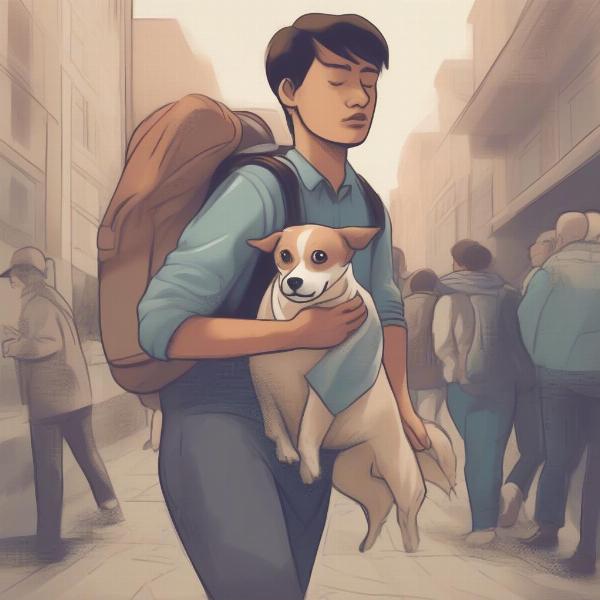Babying a dog, while seemingly driven by love and affection, can sometimes lead to unintended behavioral and emotional issues in our canine companions. This article delves into the intricacies of “babying a dog,” exploring its potential pitfalls and offering practical advice on how to nurture a well-adjusted, confident, and independent canine friend. It’s all about finding the sweet spot between showering your dog with love and providing them with the tools they need to thrive.
Understanding the Pitfalls of Over-Pampering Your Pooch
While showering our furry friends with affection is natural, excessive babying can hinder a dog’s development and create unnecessary anxieties. Dogs, like children, need a balance of love and structure to flourish. Over-pampering can manifest in several ways, from constantly carrying your dog to shielding them from everyday experiences and interactions. This can lead to a dog that is overly reliant on its owner, struggles with separation anxiety, and exhibits fear or aggression towards unfamiliar situations or people. Understanding the potential negative impacts of excessive babying is the first step towards fostering a healthy and balanced relationship with your dog.
 Babying a Dog: Negative Effects
Babying a Dog: Negative Effects
Setting Boundaries and Fostering Independence
Establishing clear boundaries and encouraging independence is crucial for raising a well-adjusted dog. This doesn’t mean withholding affection, but rather teaching your dog to be comfortable on their own and confident in navigating their environment. Start by creating designated safe spaces for your dog, such as a crate or bed, where they can retreat when feeling overwhelmed. Implement a consistent daily routine that includes scheduled feeding times, potty breaks, and play sessions. This predictability helps create a sense of security and reduces anxiety. Encourage independent play with engaging toys and puzzles, and gradually introduce your dog to new experiences and social situations in a controlled and positive manner.
The Importance of Socialization and Exposure
Socialization is paramount in preventing behavioral issues stemming from over-pampering. Exposing your dog to a variety of sights, sounds, smells, and people, especially during puppyhood, helps them develop crucial social skills and adapt to different environments. Enroll your dog in puppy classes or arrange playdates with well-socialized dogs. Take them on walks in different locations, exposing them to various stimuli. Even brief, positive encounters with strangers can greatly benefit your dog’s confidence and reduce fear of the unknown.
Training: A Cornerstone of a Balanced Relationship
Training is not just about teaching commands; it’s about building a strong bond and establishing clear communication with your dog. Through consistent and positive reinforcement training, you can teach your dog appropriate behaviors and address any anxieties or fears that may arise from being over-pampered. Focus on basic obedience commands, such as sit, stay, and come, which provide structure and help your dog understand expectations. Address unwanted behaviors like excessive barking or jumping by redirecting their attention to a more desirable activity.
Recognizing the Signs of Over-Dependence
Being aware of the signs of over-dependence can help you adjust your approach and foster more independence in your dog. If your dog exhibits excessive clinginess, follows you everywhere, whines or barks when left alone, or experiences extreme anxiety in new situations, it might be a sign that they are overly reliant on you. Addressing these behaviors early on is essential to prevent them from escalating into more serious issues.
When to Seek Professional Help
If you’re struggling to manage your dog’s over-dependence or notice concerning behaviors, don’t hesitate to seek professional guidance. A certified dog trainer or veterinary behaviorist can assess your dog’s specific needs and develop a tailored training plan to address underlying anxieties and promote healthy independence. They can also provide valuable insights and support to help you create a more balanced and fulfilling relationship with your four-legged companion.
Conclusion
Babying a dog, while often well-intentioned, can inadvertently hinder their development and create unnecessary anxieties. By understanding the pitfalls of over-pampering and focusing on fostering independence, socialization, and training, we can nurture confident, well-adjusted, and happy canine companions. It’s all about striking the right balance between showering our dogs with love and equipping them with the skills they need to thrive in the world around them. Remember, a well-balanced dog is a happy dog!
FAQ
-
How can I tell if I’m babying my dog too much? If your dog exhibits excessive clinginess, separation anxiety, or fear of new situations, it could be a sign of over-pampering.
-
Is it wrong to carry my small dog often? Occasional carrying is fine, but ensure your dog also gets ample opportunities to walk and explore independently.
-
How can I help my over-dependent dog become more independent? Create a safe space, establish a consistent routine, encourage independent play, and gradually expose them to new experiences.
-
What are the benefits of training for an over-pampered dog? Training provides structure, builds confidence, and helps address anxieties.
-
When should I seek professional help for my dog’s over-dependence? If you’re struggling to manage your dog’s anxiety or behaviors, consult a certified dog trainer or veterinary behaviorist.
-
What’s the most important thing to remember about babying a dog? Balance is key. Provide love and affection, but also encourage independence and resilience.
-
Can babying a dog lead to aggression? Yes, in some cases, over-pampered dogs may develop fear-based aggression due to a lack of proper socialization and exposure.
ILM Dog is a leading international dog website dedicated to providing expert advice on dog care and wellbeing. We offer valuable resources on dog breeds, health, training, nutrition, grooming, and more. Whether you’re a new dog owner or a seasoned expert, ILM Dog is your go-to source for reliable and practical information to help you navigate every aspect of dog ownership. Contact us at [email protected] or +44 20-3965-8624. Visit ILM Dog for more expert guidance and resources.